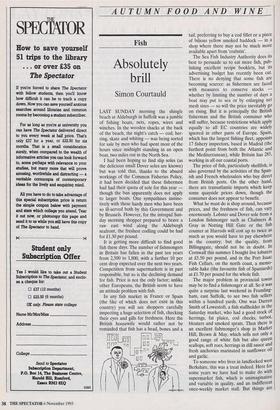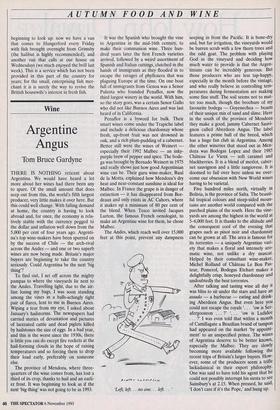AUTUMN FOOD AND WINE _
Fish
Absolutely brill
Simon Courtauld
LAST SUNDAY morning the shingle beach at Aldeburgh in Suffolk was a jumble of fishing boats, nets, ropes, wires and winches. In the wooden shacks at the back of the beach, the night's catch — cod, her- ring, skate and whiting — was being sorted for sale by men who had spent most of the hours since midnight standing in an open boat, two miles out in the North Sea.
I had been hoping to find slip soles (as the delicious small Dover soles are known) but was told that, thanks to the absurd workings of the Common Fisheries Policy, it had been decided that these fishermen had had their quota of sole for this year — though the ban apparently does not apply to larger boats. One sympathises instinc- tively with these hardy men who have been so ill-served both by this Government and by Brussels. However, for the intrepid Sun- day morning shopper prepared to brave a raw east wind along the Aldeburgh seafront, the freshest codling could be had for £1.30 per pound.
It is getting more difficult to find good fish these days. The number of fishmongers in Britain has fallen in the past ten years from 2,500 to 1,800, with a further 10 per cent drop expected over the next two years. Competition from supermarkets is in part responsible, but so is the declining demand for fish. Price is not the only factor; unlike other Europeans, the British seem to have an attitude problem with fish.
In any fish market in France or Spain (the like of which does not exist in this country) you will see shoppers carefully inspecting a huge selection of fish, checking their eyes and gills for freshness. Here the British housewife would rather not be reminded that fish has a head, bones and a
tail, preferring to buy a cod fillet or a piece of bilious yellow smoked haddock — in a shop where there may not be much more available apart from `crabstix'.
The Sea Fish Industry Authority does its best to persuade us to eat more fish, pub- lishing excellent recipe booklets, but its advertising budget has recently been cut. There is no denying that some fish are becoming scarcer: as fishermen are faced with measures to conserve stocks — whether by limiting the number of days a boat may put to sea or by enlarging net mesh sizes — so will the price inevitably go on rising. But it is principally the British fisherman and the British consumer who will suffer, because restrictions which applY equally to all EC countries are widely ignored in other parts of Europe. Spain, which has the largest fishing fleet, appoints 17 fishery inspectors, based in Madrid (the furthest point from both the Atlantic and the Mediterranean), while Britain has 285, working in all our coastal ports.
The price of fish, particularly shellfish, is also governed by the activities of the Span- ish and French wholesalers who buy direct from British ports. On the other hand, there are transatlantic imports which keep some quayside prices down, though the consumer does not appear to benefit.
What he must do is shop around, because prices, and the freshness of fish, can vary enormously. Lobster and Dover sole from a London fishmonger such as Chalmers Gray in Notting Hill Gate or the fish counter at Harrods will cost up to twice as much as you would have to pay elsewhere in the country; but the quality, from Billingsgate, should not be in doubt. In Cornwall this summer I bought live lobsters at £5.50 per pound, and in the Port Isaac Fish Cellars, on the north coast, a memo- rable hake (the favourite fish of Spaniards) at £1.70 per pound for the whole fish. The major problem in provincial towns may be to find a fishmonger at all. So it was quite a surprise last weekend in Framling- ham, east Suffolk, to see two fish sellers within a hundred yards. One was Darren Smith of Lowestoft, a fish stallholder in the Saturday market, who had a good stock of herrings, fat plaice, cod cheeks, turbot, bloaters and smoked sprats. Then there is an excellent fishmonger's shop in Market Hill, Brown & May, which sells not only a good range of white fish but also queen scallops, soft roes, herrings in dill sauce and fresh anchovies marinated in sunflower oil and garlic.
To someone who lives in landlocked west Berkshire, this was a treat indeed. Here for some years we have had to make do with supermarket fish, which is unimaginative and variable in quality, and an indifferent once-weekly market stall. But things are
AUTUMN FOOD AND WINE
beginning to look up: now we have a van that comes to Hungerford every Friday with fish brought overnight from Grimsby (the halibut is highly recommended), and another van that calls at our house on Wednesdays (we much enjoyed the brill last week). This is a service which has not been provided in this part of the country for years; for the small, enterprising fish mer- chant it is is surely the way to revive the British housewife's interest in fresh fish.











































































 Previous page
Previous page